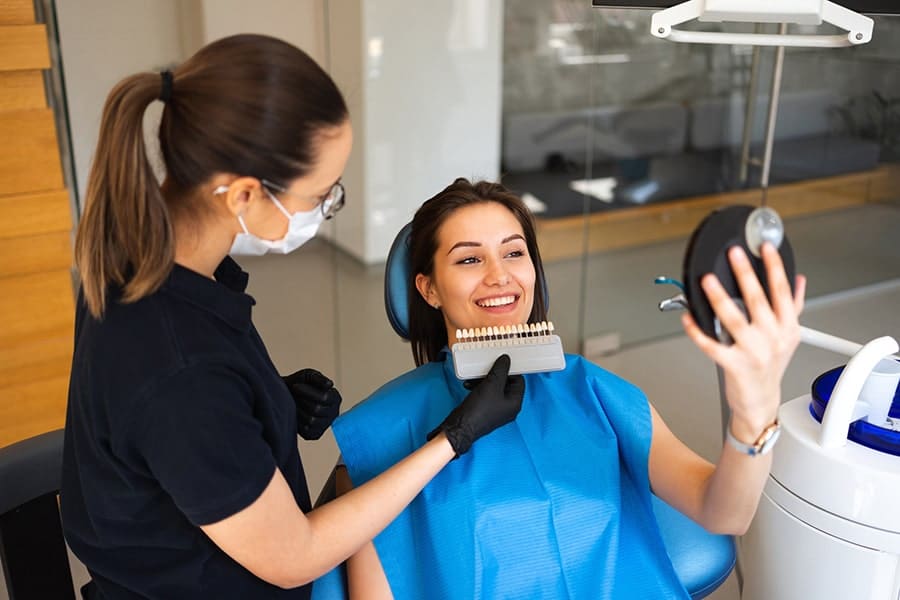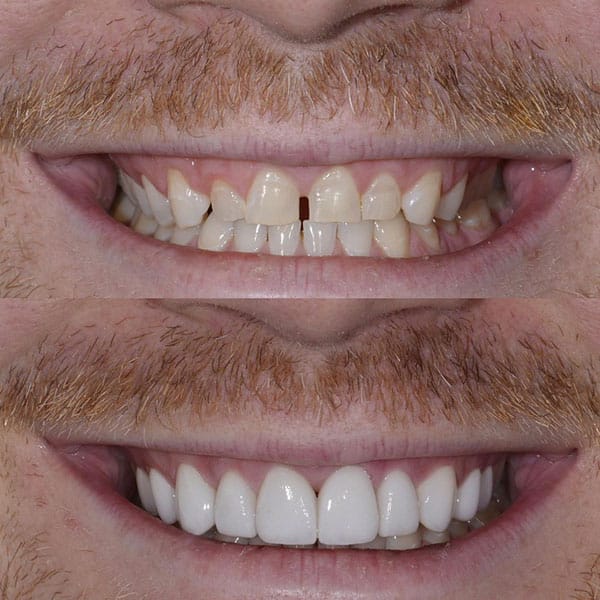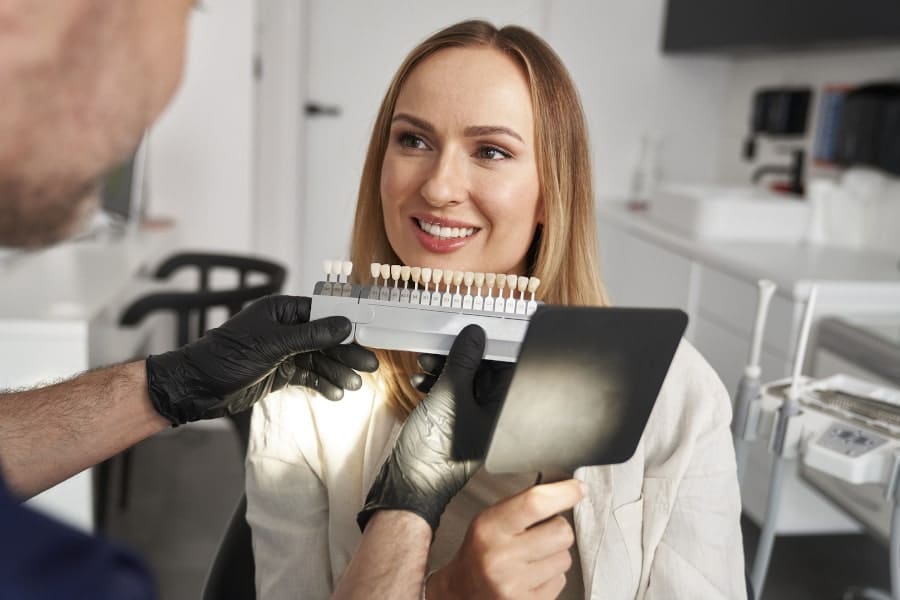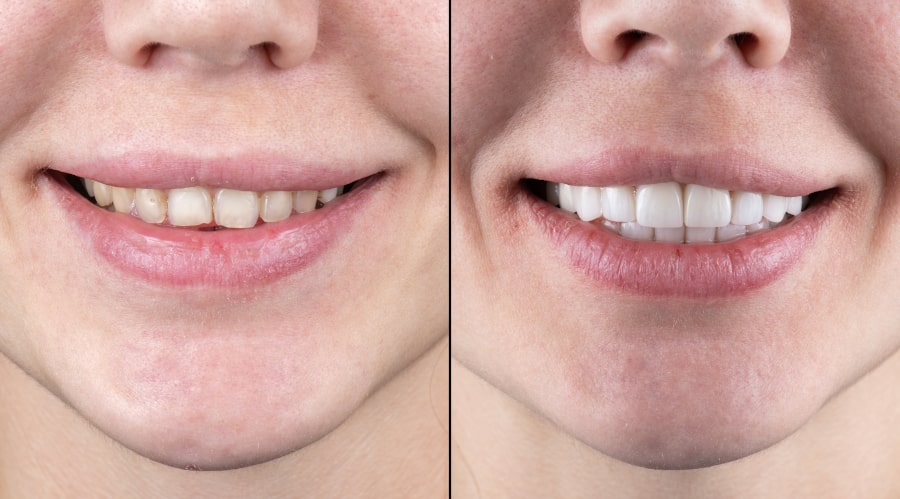Non-Prep Veneers in Toronto

What Are Non-Prep Veneers?
Non-prep veneers offer a refined, gentle approach to enhancing your smile. Unlike traditional veneers, which often require removing a noticeable amount of enamel, non-prep veneers involve bonding ultra-thin porcelain shells directly to your teeth with little or no enamel removal. Your original tooth structure is, therefore, mostly unaltered, which makes the procedure completely reversible and least intrusive. Whether a little chip, a hint of discolouration, or a modest gap, our non-prep veneers Toronto solution at The Art of Dentistry is meant to gently fix minor flaws. The emphasis is on revealing a more uniform, brilliant smile while maintaining your dental integrity. In this way, non-prep veneers become an artful blend of modern cosmetic technology and natural beauty. Experience a treatment that respects the uniqueness of your smile while gently transforming it for a more confident you.
Benefits of Non-Prep Veneers
Choosing non-prep veneers means embracing a treatment that balances beauty with care for your natural teeth. One of the main advantages is that this approach retains the natural structure of your teeth, unlike procedures when teeth are prepared for veneers, which require major enamel shaving. The procedure is not only pain-free but also entirely reversible, thereby enabling you to investigate several possibilities should you so like in the future. Additional benefits include:
- Quick Transformation: Achieve a refreshed smile in just one appointment.
- Natural Look: The veneers are carefully matched to your existing tooth colour and texture.
- Durability: Enjoy long-lasting results that stand the test of time.
This gentle approach offers a harmonious solution — enhancing your smile without compromising its natural integrity. With non-prep veneers, you benefit from an elegant cosmetic upgrade that feels both secure and natural, providing an enduring boost to your confidence.


Who Is a Good Candidate for Non-Prep Veneers?
Those looking for a subdued yet powerful improvement to their smile may find non-prep veneers suitable. If you have modest cosmetic issues — such as narrow gaps, little discoloration, or minor chips—this treatment could be the best one for you. It's meant for those who want a change without having to remove much enamel. Non-prep veneers might not be the best choice, though, if you have more serious dental problems or are suffering great misalignment. To make sure minimal prep veneers are the best match for you, we at The Art of Dentistry spend some time looking over your dental history and aesthetic goals. Our comprehensive assessment assures that your treatment fits your individual requirements, therefore producing a result that is both natural and deliberately customized to the nature of your smile.
What to Expect During the Procedure
Your journey with non-prep veneers is crafted to be simple, swift, and comfortable. The procedure starts with a friendly consultation in which we review your dental situation and talk about your desired smile. We then go on to gently prepare your teeth and provide a comprehensive cleaning. The next phase is non-invasive veneers or the exact placement of ultra-thin porcelain shells straight onto your natural teeth. The whole process is meant to be rapid and pain-free; anesthesia is not used so that you may rest during your visit. Our committed team walks you methodically to make sure you grasp every stage of your change. You will leave your consultation with a naturally attractive smile that reflects the unique craftsmanship and sophisticated ingenuity underlying the procedure.


Why Choose The Art of Dentistry for Non-Prep Veneers?
At The Art of Dentistry, we combine current technology, creativity, and expertise to provide subtle yet amazing smile makeovers. With an eye on individualized care and natural outcomes, our dedication to excellence ensures we provide Toronto's finest veneers available. Every treatment plan is designed with your particular smile in mind, therefore guaranteeing that the end product satisfies your aesthetic preferences as well as your dental condition. From your first visit to the last installation of your veneers, we pay great attention to your issues and assist you all through the procedure. Our aim is to leave you feeling confident and happy by means of a comfortable, quick encounter. Ready to explore a subtle yet stunning change? Contact us today to schedule your consultation and discover how non-prep veneers can be the key to unlocking your most confident smile.
Non-Prep Veneers Before and After
Frequently Asked Questions
What are non-prep veneers, and how do they differ from traditional veneers?
Non-prep veneers, also known as minimal-preparation veneers or ultra-thin veneers, differ from traditional veneers primarily in the amount of tooth preparation required.
Traditional veneers typically involve the removal of a small amount of enamel from the front surface of the teeth to accommodate the thickness of the veneers. This tooth preparation is irreversible, and the process may require local anaesthesia.
On the other hand, non-prep veneers are designed to be ultra-thin and require little to no enamel removal. They are often made from specialized materials that are thinner than traditional veneers, allowing for a more conservative approach. Non-prep veneers are bonded directly onto the natural tooth surface with minimal alteration.
The main advantages of non-prep veneers include preserving more natural tooth structure, the potential for reversible treatment, and the possibility of reduced sensitivity. Additionally, non-prep veneers can be a suitable option for patients who have minimal cosmetic concerns and prefer a more conservative treatment approach.
It’s important to note that not all cases are suitable for non-prep veneers, and the decision between traditional and non-prep veneers depends on various factors, including the patient’s specific dental condition and desired outcome. A consultation with a qualified cosmetic dentist is crucial to determine the most appropriate veneer option for each individual.
How long do non-prep veneers typically last?
Non-prep veneers, like traditional veneers, can last for many years with proper care and maintenance. However, the longevity of non-prep veneers may vary depending on factors such as oral hygiene practices, biting forces, tooth grinding (bruxism), and overall oral health.
On average, non-prep veneers can last around 5 to 10 years or even longer. It’s important to note that these estimates are based on general guidelines, and individual experiences may vary. Some patients may experience shorter or longer lifespans for their non-prep veneers.
To maximize the lifespan of non-prep veneers, it’s crucial to follow good oral hygiene practices, including regular brushing, flossing, and attending dental check-ups. Avoid habits that can put excessive stress on the veneers, such as biting or chewing on hard objects.
Do non-prep veneers require any tooth preparation?
Non-prep veneers, as the name suggests, typically require little to no tooth preparation. These veneers are designed to be ultra-thin and require minimal alteration of the natural tooth structure.
In some cases, minor preparation may still be necessary to achieve optimal results. This may involve smoothing or shaping the tooth surface to enhance the fit and aesthetics of the veneers. However, compared to traditional veneers, the amount of tooth preparation required for non-prep veneers is significantly reduced.
One of the advantages of non-prep veneers is their conservative nature, as they aim to preserve as much natural tooth structure as possible. This can be particularly beneficial for patients who desire a minimally invasive approach to their cosmetic dental treatment.
Are non-prep veneers suitable for everyone?
Non-prep veneers may not be suitable for everyone, as their applicability depends on individual dental conditions and treatment goals. While non-prep veneers offer certain advantages, they have specific considerations that need to be taken into account.
Non-prep veneers are generally recommended for patients with minor cosmetic concerns, such as slight discolouration, small gaps, or minor tooth imperfections. They are designed to be ultra-thin and require minimal tooth preparation, making them a more conservative option compared to traditional veneers.
However, for individuals with more significant dental concerns or structural issues, traditional veneers or alternative treatments may be more appropriate. Extensive tooth reshaping or orthodontic treatment may be necessary to achieve the desired results.
Can non-prep veneers be combined with other cosmetic dental treatments?
Yes, non-prep veneers can be combined with other cosmetic dental treatments to achieve comprehensive smile enhancements. The specific combination of treatments will depend on your unique dental needs and treatment goals.
Some common cosmetic dental treatments that can be combined with non-prep veneers include teeth whitening, dental bonding, and gum contouring. Teeth whitening can help brighten the colour of your natural teeth to ensure a seamless blend with the veneers. Dental bonding can be used to address minor tooth imperfections or add additional layers of composite material to enhance the overall aesthetics. Gum contouring can shape and balance the gum line, creating a harmonious frame for your veneers.
Orthodontic treatments, such as Invisalign or traditional braces, may also be combined with non-prep veneers to achieve optimal results. Orthodontics can help align teeth and correct bite issues, while non-prep veneers can enhance the appearance of the teeth.
Do non-prep veneers stain or discolour over time?
Non-prep veneers are typically made from high-quality dental materials, such as porcelain or composite resin, that are resistant to staining. Compared to natural tooth enamel, non-prep veneers are less likely to discolour or stain over time.
However, it’s important to note that while non-prep veneers themselves are stain-resistant, the natural teeth surrounding the veneers can still be susceptible to staining. It’s crucial to maintain good oral hygiene practices and avoid or minimize the consumption of staining substances like coffee, tea, red wine, or tobacco.
Regular brushing and flossing, along with routine dental cleanings, can help remove surface stains and maintain the overall appearance of your non-prep veneers. If you do consume staining substances, it’s advisable to rinse your mouth with water afterwards to reduce the potential for staining.
How much do non-prep veneers typically cost?
The cost of non-prep veneers can vary depending on several factors, including the number of veneers needed, the complexity of the case, the geographic location of the dental practice, and the expertise of the dentist.
On average, the cost per tooth for non-prep veneers can range from $800 to $2,500 or more. This estimate includes the cost of the veneer itself, the dental laboratory fees for fabrication, and the dental appointment fees for the placement of the veneers.
It’s important to note that this is a general price range, and the actual cost can differ based on individual factors. To get a more accurate cost estimate, it’s recommended to schedule a consultation with a cosmetic dentist. During the consultation, the dentist will evaluate your specific needs, discuss your desired outcome, and provide you with a personalized treatment plan along with a detailed cost breakdown.






